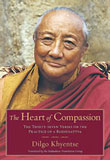


John Canti
Medical physician, Cambridge University, England; completed two three-year retreats at Chanteloube, France, 1980–1985 and 1986–1989; founding member and president of the Padmakara Translation Group, Dordogne, France; member of the working committee of the Buddhist Literary Heritage Project the 84,000; translator and editor of works such as The Words of My Perfect Teacher and The Heart Treasure of the Enlightened Ones. Tsadra Foundation fellow 2001-2014.
Completed Projects as a Tsadra Foundation Fellow
- The Hundred Verses of Advice: Tibetan Buddhist Teachings on What Matters Most, Padampa Sangye,commentary by Dilgo Khyentse (partial sponsorship)
- The Heart of Compassion: The Thirty-seven Verses on the Practice of a Bodhisattva, Gyalse Thogme, commentary by Dilgo Khyentse
- Uttaratantrashastra, Maitreya-Asanga, commentary by Jamgön Mipham
Translators
Active
Past
Institutions
Active
Past

“In 1984, Kyabje Dilgo Khyentse Rinpoche gave what is his probably most extensive recorded teaching on the practice of the Mahayana path, at Tashi Palbar Ling, his residence in the Dordogne, in southwest France.
The teaching was based on one of the most revered texts of Tibetan Buddhism, The Thirty-seven Verses on the Practice of a Bodhisattva, composed in the fourteenth century by Gyalse Ngulchu Thogme. This concise, profound poem in thirty-seven shlokas became widely known throughout the Tibetan world and, over the centuries, has been of immense benefit to countless practitioners. Easy to memorize, it is considered to be a distillation of another seminal Mahayana work, Shantideva’s great masterpiece The Way of the Bodhisattva (Bodhicharyavatara), and has been the subject of many teachings and commentaries by the great masters of all traditions of Tibetan Buddhism.
Khyentse Rinpoche’s explanations draw on the unparalleled depth of his wisdom and experience, and are oriented above all to those wishing to put these instructions into practice in everyday life. With great mastery, he shows how all the different facets and levels of the Buddhist teaching, when properly understood and applied, form a seamless, integrated whole. Dilgo Khyentse Rinpoche was one of the last of the generation of great lamas who completed their education and training in Tibet. He was one of the principal lamas of the ancient Nyingmapa tradition, an outstanding upholder of the practice lineage who spent twenty-two years of his life meditating in retreat, accomplishing the fruits of the many teachings he had received.”
—John Canti, from the Translator’s Introduction to The Heart of the Compassion: The Thirty-seven Verses on the Practice of a Bodhisattva, commentary by Dilgo Khyentse

